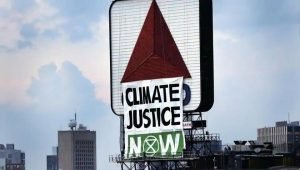![]()
It’s hot out. Cue the headlines showing yet another temperature record above the Arctic circle, fires deep in the Amazon, and more intense floods and droughts anywhere in between.
Also look for the self-described rational skeptics, the eco-pragmatists, and other hyphenated attention-seekers pointing out how, yes, it’s summer in the northern hemisphere, how it’s been hot in the past, and how we need to look at hardnosed statistics rather than headlines and emotions.
Let’s.
Yes, there have been Biblical floods and droughts long before humanity began burning fossil fuels. It’s also true, of course, that modern societies are better prepared to weather these extreme events, and that some observed impacts are due to more people and their wealth having moved in harm’s way (sadly often supported by misguided government policies).
But it’s precisely a closer look at statistics that tells us why even relatively small changes in global average temperatures are such a big deal.
Climate is weather. Not literally, of course. Climate is the long-term batting average, while weather is what happens in any one baseball game. Climate is your personality, weather is your mood today. Climate, in short, is weather averaged.
This chart from the UN Intergovernmental Panel on Climate Change shows how the two are intimately linked.
We see so many record hot temperatures precisely because global average temperatures have increased by over 1°C by now. Those relatively small increases in mean temperatures don’t just make hot weather a bit more likely. They increase the chance of hot weather extremes by a lot. Add more temperature variability to the mix, and the chance of extremes goes higher still.
Heat kills. Whether the temperature outside is 21°C or 22°C (around 70°F or 72°F) makes little difference. The latter might even register as a bit more pleasant. Increase it to 32°C (around 90°F), however, and all sorts of bad things begin to happen. If you’re a New York City high school student taking the Regents exam, you’re suddenly over 10% more likely to fail.
Hotter temperatures make workers and, with it, entire economies less productive. They kill crops. They kill animals. They kill people, especially the poor. One additional day above 32°C increases the chance of dying that year by 0.11%. And that’s in the United States.
Indians are 5 to 10 times more likely to die because of extreme heat, driven by rural India. Relatively richer urban Indians have the same mortality rate from extreme heat as the average American, pointing to the impact of extreme poverty. The rich adapt. The poor suffer.
If climate change is your personality and weather your mood, climate change is making all of us moodier. That goes for increased road rage and car crashes on hot days as much as for increased police aggression, robberies, domestic violence, assaults, and murders. And heat on the baseball field leads to more pitchers hitting batters with errant balls as retaliation.
These individual effects extend to increased peasant rebellions in Qing China, political instability in Medieval Egypt, ethnic riots in India, communal conflict in sub-Saharan Africa, and civil conflicts and political coups globally. The link between climate and conflict is strong, and unmitigated climate change all but ensures that it’s getting stronger.







